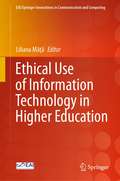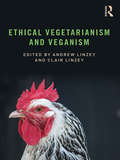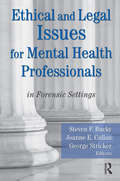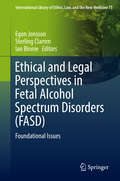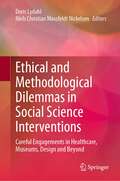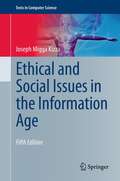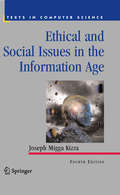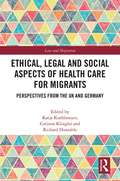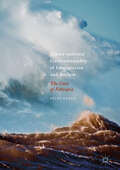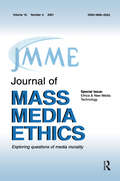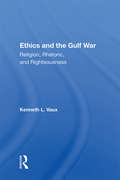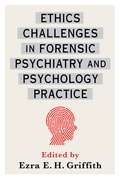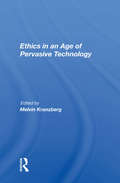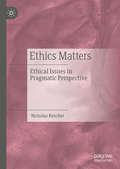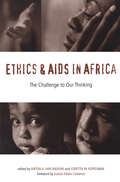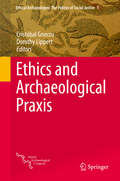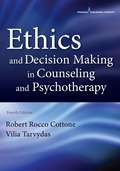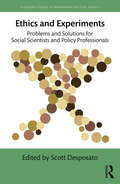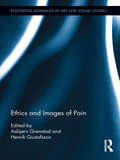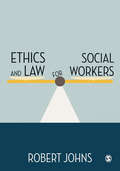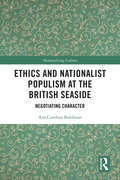- Table View
- List View
Ethical Use of Information Technology in Higher Education (EAI/Springer Innovations in Communication and Computing)
by Liliana MâțăThis book addresses current issues regarding the ethical use of information technology in a holistic vision, by combining the perspectives of education specialists and those in the field of computer science at the level of higher education. It provides a current ethical perspective on the problems and solutions involved in the use of information technology in higher education. It appeals to readers interested in exploring the problems and appropriate solutions related to the ethical use of new technologies in higher education.
Ethical Vegetarianism and Veganism
by Andrew Linzey Clair LinzeyThe protest against meat eating may turn out to be one of the most significant movements of our age. In terms of our relations with animals, it is difficult to think of a more urgent moral problem than the fate of billions of animals killed every year for human consumption. This book argues that vegetarians and vegans are not only protestors, but also moral pioneers. It provides 25 chapters which stimulate further thought, exchange, and reflection on the morality of eating meat. A rich array of philosophical, religious, historical, cultural, and practical approaches challenge our assumptions about animals and how we should relate to them. This book provides global perspectives with insights from 11 countries: US, UK, Germany, France, Belgium, Israel, Austria, the Netherlands, Canada, South Africa, and Sweden. Focusing on food consumption practices, it critically foregrounds and unpacks key ethical rationales that underpin vegetarian and vegan lifestyles. It invites us to revisit our relations with animals as food, and as subjects of exploitation, suggesting that there are substantial moral, economic, and environmental reasons for changing our habits. This timely contribution, edited by two of the leading experts within the field, offers a rich array of interdisciplinary insights on what ethical vegetarianism and veganism means. It will be of great interest to those studying and researching in the fields of animal geography and animal-studies, sociology, food studies and consumption, environmental studies, and cultural studies. This book will be of great appeal to animal protectionists, environmentalists, and humanitarians.
Ethical Violence
by Carlo BordoniHuman civilization is founded on ethical principles, norms of behaviour that have accumulated over time. Perhaps the oldest of ethical principles is the rejection of violence, which includes the respect for life and for the physical and psychological integrity of others. But, in some circumstances, violence itself can be regarded as ethical – for example, when it is used by states claiming to act in self-defence. In these circumstances, the need to defend oneself against an enemy can transform war from an unacceptable act into a necessary, socially shared and morally sanctioned choice. And it is when violence becomes ethical that we must begin to fear for our future. In the wake of the pandemic, we are witnessing the growing prevalence of aggression and emotionality in social and political life. We find ourselves living in an increasingly impatient and insecure society, which is sceptical of scientific thought and which takes refuge in the irrational. The decline of rationality and the growing prevalence of violence are increasingly common features of a society that has lost touch with the great Enlightenment narrative. We need, argues Bordoni, to rediscover the rationality we have lost and recuperate the positive side of technology.
Ethical and Legal Issues for Mental Health Professionals: in Forensic Settings
by George Stricker Steven F. Bucky Joanne E. CallanGet crucial ethical and clinical knowledge as it relates to the legal system Ethical and Legal Issues for Mental Health Professionals: in Forensic Settings comprehensively focuses on the integration of ethical, legal, and clinical issues for practicing mental health professionals dealing with legal processes in forensic settings. This unique text is organized around the most current ethical and legal standards as defined by the mental health professionals of psychology, social work, marriage and family therapy, and psychiatry. Respected well-known authorities with diverse backgrounds, expertise, and professional experience offer a far-reaching discussion of ethical and legal issues important for every mental health professional to know. Practicing clinicians increasingly find themselves needing to deal with the legal system about a multitude of issues. Ethical and Legal Issues for Mental Health Professionals: in Forensic Settings not only presents mental health professionals, but also attorneys who defend mental health professionals providing legal and ethical discussions of importance to the field. This powerful resource provides up-to-date crucial knowledge for graduate students and clinicians alike. The final book in the three volume series will focus on special populations/special treatment modalities. Topics in Ethical and Legal Issues for Mental Health Professionals: in Forensic Settings include: the discovery process depositions personal injury evaluations various types of witness preparation for court testimony psychological evaluations juvenile court dependency forensic evaluations dealing with litigation with civil lawsuits tests that relate to false memories of trauma APA’s Ethics Committee process and State Ethics Committees processes Ethical and Legal Issues for Mental Health Professionals: in Forensic Settings is an essential text for all mental health professionals, including psychologists, psychiatrists, social workers, counselors, therapists, and graduate students in mental health and related fields.
Ethical and Legal Perspectives in Fetal Alcohol Spectrum Disorders (FASD)
by Egon Jonsson Sterling Clarren Ian BinnieThis book discusses how to deal ethically with people with Fetal Alcohol Spectrum Disorder (FASD) in the police, courts and correctional services. Ethical and legal issues associated with the deficits of individuals with a brain disorders such as FASD are surfacing more and more frequently in criminal proceedings. People with FASD often have not been diagnosed and rarely exhibit any visible evidence of the disorder. It has been argued that this invisible disability puts them in a disadvantaged position in the justice system, since the awareness of this condition is limited. The need to identify and to address FASD more effectively and the many ethical issues this raises within the context of the law is increasingly acknowledged within judicial and legislative branches, as well as in government departments, agencies and community programs that provide services to those with FASD and their caretakers and families. This is the first book to give to elaborate on ethical and legal issues of FASD.
Ethical and Methodological Dilemmas in Social Science Interventions: Careful Engagements in Healthcare, Museums, Design and Beyond
by Niels Christian Mossfeldt Nickelsen Doris LydahlThis book develops an understanding of researchers' engagements with their subjects as a generative mode of knowledge production that takes place between researchers and their research fields. It promotes the idea that rather than value neutrality, caring may be helpful when a researcher makes suggestions for improvement and constructs interventions. The authors reflect on questions such as how researchers take can sides without taking a fundamental principle of action for granted. What tensions and obstacles do researchers meet while they strive to engage carefully? How do careful engagements affect academic work and output? What inequalities are produced especially when there is funding involved in the research? The contributions discuss a range of topics including responsibility (and response-ability), collaboration, proximity, ethics, bodily entanglements, values, and affective attachments in social research. The book brings together an impressive team of international researchers from different disciplines to nuance the discussion and provides a rich collection of empirical studies from healthcare, urban planning, environmental science, participatory design, and museums, among others. This is a very topical volume for all social and behavioural scientists engaging in research, particularly those engaged in ethnographic research.
Ethical and Social Issues in the Information Age (Texts in Computer Science)
by Joseph Migga KizzaThis new edition examines the ethical, social, and policy challenges stemming from computing and telecommunication technology, and mobile information-enabling devices. Features: establishes a philosophical framework and analytical tools for discussing moral theories and problems in ethical relativism; offers pertinent discussions on privacy, surveillance, employee monitoring, biometrics, civil liberties, harassment, the digital divide, and discrimination; examines the new ethical, cultural and economic realities of computer social networks; reviews issues of property rights, responsibility and accountability relating to IT and software; discusses how virtualization technology informs ethical behavior; introduces the frontiers of ethics in VR, AI, and the Internet; surveys the social, moral and ethical value systems in mobile telecommunications; explores the evolution of electronic crime, network security, and computer forensics; provides exercises, objectives, and issues for discussion in every chapter.
Ethical and Social Issues in the Information Age, 4th Edition
by Joseph Migga KizzaThe frequency of new editions of this book is indicative of the rapid and tremendous changes in the fields of computer and information sciences. First published in 1995, the book has rapidly gone through three editions already and now we are in the fourth. Over this period, we have become more dependent on computer and telecommunication technology than ever before and computer technology has become ubiquitous. Since I started writing on social computing, I have been advocating a time when we, as individuals and as nations, will become totally dependent on computing technology. That time is almost on us. Evidence of this is embodied in the rapid convergence of telecommunication, broadcasting, and computing devices; the miniaturization of these devices; and the ever increasing storage capacity , speed of computation, and ease of use. These qualities have been a big pulling force sucking in millions of new users every day, sometimes even those unwilling. Other appealing features of these devices are the increasing number of applications, apps, as they are increasingly becoming known, and being wireless and easily portable. Whether small or big, these new gizmos have become the centerpiece of an individual’s social and economic activities and the main access point for all information. Individuals aside, computing technology has also become the engine that drives the nations’ strategic and security infrastructures that control power grids, gas and oil storage facilities, transportation, and all forms of national communication, including emergency services.
Ethical and Social Issues in the Information Age, 5th Edition
by Joseph Migga KizzaThis new edition examines the ethical, social, and policy challenges stemming from computing and telecommunication technology, and mobile information-enabling devices. Features: establishes a philosophical framework and analytical tools for discussing moral theories and problems in ethical relativism; offers pertinent discussions on privacy, surveillance, employee monitoring, biometrics, civil liberties, harassment, the digital divide, and discrimination; examines the new ethical, cultural and economic realities of computer social networks; reviews issues of property rights, responsibility and accountability relating to IT and software; discusses how virtualization technology informs ethical behavior; introduces the frontiers of ethics in VR, AI, and the Internet; surveys the social, moral and ethical value systems in mobile telecommunications; explores the evolution of electronic crime, network security, and computer forensics; provides exercises, objectives, and issues for discussion in every chapter.
Ethical, Legal and Social Aspects of Healthcare for Migrants: Perspectives from the UK and Germany (Law and Migration)
by Richard Huxtable Katja Kuehlmeyer Corinna KlinglerNumerous important issues arise in relation to the health of, and healthcare for (and by), migrants. Much commentary on the migrant crisis and healthcare has focused on the allocation of resources, with less discussion of the needs of, and provision for, migrants. Presenting a comparative perspective on the UK and Germany, this volume increases knowledge of a broad spectrum of challenges in healthcare provision for migrants. ‘Migration’ is deliberately understood in its broadest sense and includes not only migrant patients but also migrant healthcare professionals. The book’s content is diverse, with insights from healthcare ethics, healthcare law, along with clinical perspectives as well as perspectives from the social sciences. The collection provides normative reflections on current issues, and presents data from empirical studies. By informing researchers, politicians and healthcare practitioners about approaches to challenges arising in healthcare provision for migrants, the collection seeks to inform the development of adequate and ethically appropriate strategies.
Ethico-political Governmentality of Immigration and Asylum: The Case of Ethiopia
by Dilek KaralBased on content analyses of three international organizations’ policy reports and interviews with Somali refugees and refugee organizations, Dilek Karal examines the construction of ethico-political paradigm for immigration and asylum policies in Ethiopia. Departing from an assertion that ethico-political power is an intrinsic part of neo-liberal governmentality (and thus immigration and asylum policy formation), this volume unearths its mechanisms in Ethiopia’s current immigration and refugee legislation and in global policy propositions moving forward. Ultimately, the exclusionary character of the propositions for Ethiopian states’ governance of migrants is revealed through close interviews, data analysis, and applied analytics of governmentality method.
Ethics & New Media Technology: A Special Issue of the journal of Mass Media Ethics
by Lawrence ErlbaumThis special issue shows that "old ethics" don't always provide ready answers to problems raised by new technology. Exploring the perplexing topic of ethics in new media, this special issue: *examines the ethics of the highly controversial 1998 Cincinnati Enquirer exposé of Chiquita Brands International; *reports on a pilot project involving online journalists and online journalism graduate students; *investigates the extent to which e-mail and listservs are--and could be--effective fora for journalists interested in exploring matters of ethics; and *provides a useful annotated webliography of information resources.
Ethics And The Gulf War: Religion, Rhetoric, And Righteousness
by Kenneth L. VauxThe war on the ground and in the air over Kuwait and Iraq was not the only Gulf War being fought in early 1990. George Bush and Saddam Hussein were also battling for public opinion and for the perception of legitimacy for their actions. In this effort, both men as well as their spokespersons appealed to the just war theory of their religious traditions. In this perceptive and wide-ranging book, Kenneth Vaux elucidates the great just war traditions of Judaism, Christianity, and Islam, evaluating the key events of the war in light of the religious rhetoric used by both sides. From the first stirrings of conflict to its uncertain aftermath, religious and ethical traditions played a major role in winning support not just for the U.S. and Iraqi peoples but of public opinion worldwide. Throughout Vaux demonstrates the wide gaps between religious rhetoric and the political-military action it has been called on to support. Ethics and the Gulf War is not a typical ethical treatise; Vaux understands ethical reflection to encompass history, philosophy, psychology, ecology, theology, and eschatology. His book is a valuable contribution to the understanding of the Gulf War, and it is fascinating for scholars and laypersons coming to this subject from almost any area of interest.
Ethics Challenges in Forensic Psychiatry and Psychology Practice
by Edited by Ezra E. H. GriffithForensic psychiatry and psychology involve specialized practice with unique patients, including children, the incarcerated, and involuntary clients, presenting practitioners with specific ethics challenges. In this volume, Ezra E. H. Griffith offers a selection of engaging essays that guide practicing forensic specialists through particular situations that often result in ethics dilemmas.In chapters covering topics such as forensic practice and critical feminist theory, neuroethics in court, work with asylum applicants, and ethics problems presented by the internet, the contributors demonstrate methods to help practitioners resolve problems that they are likely to encounter in forensic practice. The concentrated focus on thinking through ethics quandaries encourages forensic practitioners to reflect regularly on the ethics dimensions of their work and provides them with the tools to create ethics-based solutions that are transparent and understandable and best serve their clients. This essential book provides a roadmap for specialists in these evolving fields to recognize dilemmas through reflection and consideration, thoughtfully articulate the problems, and create solutions.
Ethics In An Age Of Pervasive Technology
by Melvin KranzbergGrappling with the moral dimensions of the ways in which technology is applied in today's world, some of the keenest minds of our time raise and attempt to answer four major questions: Do our current problems represent a new element in human affairs or are they merely a continuation of past problems altered somewhat by the pervasiveness of technolo
Ethics Matters: Ethical Issues in Pragmatic Perspective
by Nicholas RescherThis book covers a varied spectrum of ethical topics, ranging from the fundamental considerations regarding ethical values, to the rationale of obligation, and the ethical management of societal and personal affairs. Nicholas Rescher shows how fundamental general principles underpin the pragmatic stance we can appropriately take on questions of specific ethical detail. His work on these issues is pervaded by a certain pragmatic point of view. As the popular dictum has it, we humans come this way but once, with just a single lifetime available, to each one of us. Rescher argues that it is a matter of rational self-interest and ethical obligation to use this opportunity for doing something towards making the world a better home for ourselves and our posterity.
Ethics and AIDS in Africa: The Challenge to Our Thinking
by Anton A. van Niekerk Loretta M. KopelmanAfrica poses daunting medical, social, and economic challenges, placing local, regional, national, and international communities at a moral crossroads. This book, the first to systematically examine the ethical implications of the AIDS pandemic for Africa, examines such pressing questions as: How do we deal with the uncertainties surrounding AIDS statistics? Is it really too costly to provide people highly active antiretroviral therapies in Africa? What is the relationship between AIDS and poverty? Is the political leadership in South Africa doing what is right and prudent to meet the challenge of AIDS? Is the developed world responding responsibly and justly to this crisis in the developing world? Is it moral for companies to make profits from AIDS drugs? Given the scope of the crisis, ought First World ethical standards for doing research on AIDS drugs and vaccines to apply unchanged to Africa? Ought we to include children in research for AIDS vaccines, and if so, how? Why do people persist in regarding AIDS as punishment for sin?
Ethics and Archaeological Praxis
by Dorothy Lippert Cristóbal GneccoRestoring the historicity and plurality of archaeological ethics is a task to which this book is devoted; its emphasis on praxis mends the historical condition of ethics. In doing so, it shows that nowadays a multicultural (sometimes also called "public") ethic looms large in the discipline. By engaging communities "differently," archaeology has explicitly adopted an ethical outlook, purportedly striving to overcome its colonial ontology and metaphysics. In this new scenario, respect for other historical systems/worldviews and social accountability appear to be prominent. Being ethical in archaeological terms in the multicultural context has become mandatory, so much that most professional, international and national archaeological associations have ethical principles as guiding forces behind their openness towards social sectors traditionally ignored or marginalized by their practices. This powerful new ethics--its newness is based, to a large extent, in that it is the first time that archaeological ethics is explicitly stated, as if it didn't exist before--emanates from metropolitan centers, only to be adopted elsewhere. In this regard, it is worth probing the very nature of the dominant multicultural ethics in disciplinary practices because (a) it is at least suspicious that at the same time archaeology has tuned up with postmodern capitalist/market needs, and (b) the discipline (along with its ethical principles) is contested worldwide by grass-roots organizations and social movements. Can archaeology have socially committed ethical principles at the same time that it strengthens its relationship with the market and capitalism? Is this coincidence just merely haphazard or does it obey more structural rules? The papers in this book try to answer these two questions by examining praxis-based contexts in which archaeological ethics unfolds.
Ethics and Decision Making in Counseling and Psychotherapy, Fourth Edition
by Vilia Tarvydas Robert Rocco Cottone R. Rocco CottoneFocuses on the nuances of ethical and legal standards across disciplines <P><P>Completely revised and updated to reflect the new 2014 ACA Code of Ethics and current ethics codes in psychology, social work, and marriage and family therapy. This unparalleled text guides helping professionals in the use of ethical decision-making processes as the foundation for ethical approaches to counseling and psychotherapy. The book focuses on ethical and legal challenges and standards across multiple professions emphasizing counseling, and including the professions of psychology, social work, and marriage and family therapy. It not only identifies relevant ethical issues in clinical mental health, rehabilitation, group, school, addictions counseling, and career counseling, it also addresses couple and family therapy, clinical supervision, and forensics. The text illuminates the particular application of ethical standards within each specialty. <P><P>The book features five new sections that clearly define how ethical standards are interpreted and applied: Privacy, Confidentiality, and Privileged Communication; Informed Consent; Roles and Relationships with Clients; Professional Responsibility; and Counselor Competency. Under the umbrella of each broad topic, the particular nuances of ethical standards within each specialty are analyzed to facilitate comparison across all specialties and settings. The text also addresses current issues in office and administrative practices, technology, and forensic practice that are crucial to school, clinical, and private practice settings. Compelling case studies illustrate the connection between ethical decision-making models and ethical practice. Learning objectives, a comprehensive review of scholarly literature, and a robust ancillary package for educators contribute to the fourth edition's value for use in upper-level undergraduate and graduate classrooms.
Ethics and Experiments: Problems and Solutions for Social Scientists and Policy Professionals (Routledge Studies in Experimental Political Science)
by Scott DesposatoFor most of political science's history, discussions about professional ethics had nothing to do with human subjects. Professional ethics involved integrity in the classroom, fair tenure and promotion rule, and the careful avoidance of plagiarism. As most research was observational, there was little need for attention to how scholarly activities might directly affect the subjects of our work. Times have changed. The dramatic growth in the use of experiments in social science, especially overseas, is generating unexpected ethical controversies. The purpose of this volume is to identify, debate, and propose practical solutions to the most critical of these new ethical issues. A leading team of internationally distinguished political science scholars presents the first examination of the practical and ethical challenges of research with human subjects in social science and policy studies. Part 1 examines contextual challenges provided by experiments conducted overseas - questions of culture, religion, security, and poverty. Part 2 examines questions of legal constraints on research, focusing on questions of foreign review of international experiments. Part 3 tackles the critical issues in field experiments, including deception and consent, impact on elections and careers, the boundaries of the public officials' exemption, and the use of partner organizations to avoid Institutional Review Body (IRB) review. Part 4 considers strategies for the future, including training and education, IRB reform, institutional changes, and norm development.
Ethics and Images of Pain (Routledge Advances in Art and Visual Studies)
by Asbjørn Grønstad Henrik GustafssonFew phenomena are as formative of our experience of the visual world as displays of suffering. But what does it mean to have an ethical experience of disturbing or traumatizing images? What kind of ethical proposition does an image of pain mobilize? How may the spectator learn from and make use of the painful image as a source of ethical reflection? Engaging with a wide range of visual media--from painting, theatre, and sculpture, to photography, film, and video--this interdisciplinary collection of essays by leading and emerging scholars of visual culture offers a reappraisal of the increasingly complex relationship between images of pain and the ethics of viewing. Ethics and Images of Pain reconsiders the persistent and ever pertinent nexus of aesthetics and ethics, the role of painful images as generators of unpredictable forms of affect, the moral transformation of spectatorship, the ambivalence of the witness and the representation of afflication as a fundamental form of our shared scopic experience. The instructive and illuminating essays in the collection introduce a phenomenological context in which to make sense of our current ecology of excruciating images, one that accentuates notions of responsibility, empathy, and imagination. Contributors trace the images of pain across a miscellany of case studies, and amongst the topics addressed are: the work of artists as disparate as Doris Salcedo, Anselm Kiefer and Bendik Riis; photographs from Abu Ghraib and Rwanda; Hollywood war films and animated documentaries; performances of self-immolations and incidents of police brutality captured on mobile phones.
Ethics and Law for Social Workers
by Dr Robert JohnsHow do social workers in the UK legal context act ethically? What do we understand by ethics and how does social work law relate to it? Social work practice in all countries incorporates a clear, unstinting commitment to social justice, but what is social justice? Using an applied, practice-based and refreshingly 'real' approach, this text bridges the gap between law and ethics. Each chapter opens with a case study which considers ethical dilemmas in real life practice. Chapters have been designed to help students strengthen their critical reflection skills, encouraging consideration of the legal and ethical dimensions of social work generally and in personal practice. Topics such as care proceedings, adoption, community care, youth justice, mental capacity and accountability explore how understanding and application are equally important.
Ethics and Law for Social Workers
by Dr Robert JohnsHow do social workers in the UK legal context act ethically? What do we understand by ethics and how does social work law relate to it? Social work practice in all countries incorporates a clear, unstinting commitment to social justice, but what is social justice? Using an applied, practice-based and refreshingly 'real' approach, this text bridges the gap between law and ethics. Each chapter opens with a case study which considers ethical dilemmas in real life practice. Chapters have been designed to help students strengthen their critical reflection skills, encouraging consideration of the legal and ethical dimensions of social work generally and in personal practice. Topics such as care proceedings, adoption, community care, youth justice, mental capacity and accountability explore how understanding and application are equally important.
Ethics and Nationalist Populism at the British Seaside: Negotiating Character (Materializing Culture)
by Ana Carolina BalthazarDrawing on ethnographic research at the British seaside, this book offers an original and insightful anthropological contribution to the study of contemporary Britain and nationalism. The volume focuses on people who have retired from different parts of the UK to the seaside town of Margate and nearby areas, exploring their ethical negotiations and relationship with things that ‘have history’. It considers how residents engage daily with objects, houses and places ‘with character’ and how such ordinary engagements underlie nationalist sentiments and the Brexit vote. Ana Carolina Balthazar demonstrates that those who have reached a comfortable financial position often look for ways to reconnect with their working-class upbringing and, while doing so, engage with the national past in a very tangible manner. Contributing to social scientific debates on class dynamics and ethics, the book provides a different perspective on nationalist populism, one which moves beyond media stereotypes and arguments made about the ‘left behind’ and ‘longing for empire’ in ‘post-industrial’ Britain.
Ethics and Philosophical Critique in William James
by Sarin MarchettiMarchetti offers a revisionist account of James's contribution to moral thought in the light of his pragmatic conception of philosophical activity. He sketches a composite picture of a Jamesian approach to ethics revolving around the key notion and practice of a therapeutic critique of one's ordinary moral convictions and style of moral reasoning.
